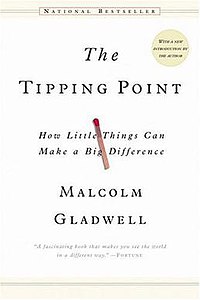Maybe it's just because there have been so many books in recent years that have made similar points, but I just did not find this book by Malcolm Gladwell that revolutionary. He offered some interesting anecdotes and classifications with regard to how "epidemics" of ideas, trends, behaviors, etc. are promulgated. He identifies some key types of players in the process. There are those who are especially good at making connections between people ("Connectors"), those who love becoming experts and using that expertise to help others ("Mavens"), and those who can translate concepts meaningfully to the person in front of them ("Salesmen"). He discusses Hush Puppies, Sesame Street, teen suicide in Micronesia, teen smoking in the U.S., and in an Afterword to this paperback 2002 publication, the school shooting "epidemic" in the U.S. He makes a compelling case for context as a powerful force in determining behavior with his discussion of the radical decline in violent crime in NYC in the 1990's, citing twin studies, "broken window" theorists, and crime statistics. At times, the book feels a little disjointed--I'm not really sure where he wants us to go with him. The subtitle of the book is "How Little Things Can Make a Big Difference"...the "tipping point" is defined as "that magic moment when an idea, trend, or social behavior crosses a threshold, tips, or spreads like wildfire" (back cover). And he does offer various explanations and factors to consider in how that happens, what is required. What I came away with was a refocused attention on how media today can shape social phenomena that have become somewhat epidemic, like school shootings. I have perhaps slightly different questions about the precipitous rise in social behaviors like "cutting," or eating disorders, or autism, or ADHD. Any book that makes you think, I suppose, is laudable, I just didn't find this one to live up to all the hype I had heard. Perhaps some of Gladwell's other books?

No comments:
Post a Comment